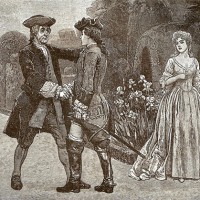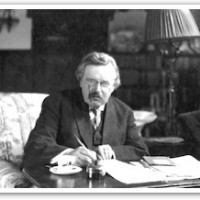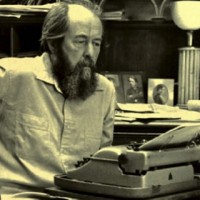A Noble Imagination: Sir Walter Scott’s Waverley, by James P. Bernens
If you would wish for your children to garner a love and fascination for the good things of God’s Creation, if you would have them embrace adventure, cherish what is noble, honor the poor, and attain to a sincere civility and gentleness, let them read from the works of Sir Walter Scott.
Born in 1771 in the city of Edinburgh, Walter Scott came of age in a century that had seen the uneasy political union of the kingdoms of England and Scotland, and was about to see the upheaval of the American and French Revolutions. Drawing from the deep well of British and medieval history, Scott established himself as one of the premier poets of his age, and one of the finest pure storytellers the English language has ever seen. His first novel, Waverley, remains once of his best, although it is less recognizable to modern readers than many other excellent titles like Ivanhoe and Rob Roy.
First published in 1814, Waverley is a lovely and heroic tale which follows the journey of young Edward Waverley, an impressible English gentleman and army officer, who is posted to duty in the tumultuous scene of eighteenth-century Scotland. Mindful of the old Royalist history of his own family, and carried on a string of fate that brings him into league with a Highland clan, Waverley becomes embroiled in the 1745 “Jacobite” rebellion, which seeks to replace Britain’s King George with the exiled Catholic Stuarts. If this chapter of British history sounds obscure, the reader may be comforted to know that much context is incorporated into the fabric of the story by the keen antiquarian mind of Sir Walter Scott himself.
More than anything, Waverley evolves into an adventurous ramble through the genteel courts and fearsome wilds of Scotland and England. There are portions of the novel which simply cannot be forgotten: as when Waverley stands enchanted by the Gaelic music of beauteous Flora Mac-Ivor; or when the rash hero suddenly finds himself pledging his sword in the service of the charismatic Jacobite leader, Bonnie Prince Charlie; or when the great Catholic Highland chieftain, the Vich Ian Vohr, manfully meets his end with the laughing phrase, “This is well got up for a closing scene.”
But the excellence of Waverley extends beyond the many opportunities for suspense and enjoyment which it affords the reader. Like much else that Scott wrote, it provides a lesson in poetry and healthy imagination, and reassures the observant mind of the goodness of the age-old morals. It was this quality in Scott’s writing which drew the special admiration of another venerable Briton, the famous Catholic convert John Henry Newman. In 1839, six years before his conversion to Rome, Newman wrote:
During the first quarter of this century a great poet [Scott] was raised up in the North, who, whatever were his defects, has contributed by his works, in prose and verse, to prepare men for some closer and more practical approximation to Catholic truth. The general need of something deeper and more attractive than what had offered itself elsewhere, may be considered to have led to his popularity; and by means of his popularity he re-acted on his readers, stimulating their mental thirst, feeding their hopes, setting before them visions, which, when once seen, are not easily forgotten, and silently indoctrinating them with nobler ideas, which might afterwards be appealed to as first principles.
Newman saw in Scott’s writing—of which Waverley is a foremost example—an excellence and superiority that helped move men’s minds towards a healthy Christian culture. For the same reason, Dr. Russell Kirk, writing in 1993, esteemed Sir Walter Scott as one of his ten exemplary conservatives in the history of Western Civilization.
Now, after all this has been said, you might be moved to ask: “If this is true, why have I heard and seen so little of the books written by this eminent Scotsman?”
Read the complete article in Crisis Magazine
G. K. Chesterton: It’s Not Gay, and It’s Not Marriage, by Dale Ahlquist
One of the pressing issues of Chesterton’s time was “birth control.” He not only objected to the idea, he objected to the very term because it meant the opposite of what it said. It meant no birth and no control. I can only imagine he would have the same objections about “gay marriage.” The idea is wrong, but so is the name. It is not gay and it is not marriage.
Chesterton was so consistently right in his pronouncements and prophecies because he understood that anything that attacked the family was bad for society. That is why he spoke out against eugenics and contraception, against divorce and “free love” (another term he disliked because of its dishonesty), but also against wage slavery and compulsory state-sponsored education and mothers hiring other people to do what mothers were designed to do themselves. It is safe to say that Chesterton stood up against every trend and fad that plagues us today because every one of those trends and fads undermines the family. Big Government tries to replace the family’s authority, and Big Business tries to replace the family’s autonomy. There is a constant commercial and cultural pressure on father, mother, and child. They are minimized and marginalized and, yes, mocked. But as Chesterton says, “This triangle of truisms, of father, mother and child, cannot be destroyed; it can only destroy those civilizations which disregard it.”
This latest attack on the family is neither the latest nor the worst. But it has a shock value to it, in spite of the process of de-sensitization that the information and entertainment industries have been putting us through the past several years. Those who have tried to speak out against the normalization of the abnormal have been met with “either slanging or silence,” as Chesterton was when he attempted to argue against the faddish philosophies that were promoted by the major newspapers in his day. In 1926, he warned, “The next great heresy will be an attack on morality, especially sexual morality.” His warning has gone unheeded, and sexual morality has decayed progressively. But let us remember that it began with birth control, which is an attempt to create sex for sex’s sake, changing the act of love into an act of selfishness. The promotion and acceptance of lifeless, barren, selfish sex has logically progressed to homosexuality.
Chesterton shows that the problem of homosexuality as an enemy of civilization is quite old. In The Everlasting Man, he describes the nature-worship and “mere mythology” that produced a perversion among the Greeks. “Just as they became unnatural by worshipping nature, so they actually became unmanly by worshipping man.” Any young man, he says, “who has the luck to grow up sane and simple” is naturally repulsed by homosexuality because “it is not true to human nature or to common sense.” He argues that if we attempt to act indifferent about it, we are fooling ourselves. It is “the illusion of familiarity,” when “a perversion become[s] a convention.”
Read the complete article in Crises Magazine
Solzhenitsyn: The Courage to be a Christian, by Joseph Pearce.
In these dark days in which the power of secular fundamentalism appears to be on the rise and in which religious freedom seems to be imperiled, it is easy for Christians to become despondent. The clouds of radical relativism seem to obscure the light of objective truth and it can be difficult to discern any silver lining to help us illumine the future with hope.
In such gloomy times the example of the martyrs can be encouraging. Those who laid down their lives for Christ and His Church in worse times than ours are beacons of light, dispelling the darkness with their baptism of blood. “Upon such sacrifices,” King Lear tells his soon to be martyred daughter Cordelia, “The gods themselves throw incense.”
It is said that the blood of the martyrs is the seed of the Church and, if this is so, more bloody seed has been sown in the past century than in any of the bloody centuries that preceded it. Tens of millions have been slaughtered on the blood-soaked altars of national and international socialism in Europe, China, Cambodia and elsewhere. Today, in many parts of the world, millions upon millions are being slaughtered in the womb in the name of “reproductive rights.”
In such a meretricious age the giant figure of Alexander Solzhenitsyn emerges as a colossus of courage. Born in Russia in 1918, only months after the secular fundamentalists had swept to power in the Bolshevik Revolution, Solzhenitsyn was brainwashed by a state education system which taught him that socialism was just and that religion was the enemy of the people. Like most of his school friends, he enslaved himself to the zeitgeist, became an atheist and joined the communist party.
Serving in the Soviet army on the Eastern Front during the Second World War he witnessed cold blooded murder and the raping of women and children as the Red Army took its “revenge” on the Germans. Disillusioned, he committed the indiscretion of criticizing the Soviet leader Josef Stalin and was imprisoned for eight years as a political dissident.
While in prison, he resolved to expose the horrors of the Soviet system. Shortly after his release, during a period of compulsory exile in Kazakhstan, he was diagnosed with a malignant cancer in its advanced stages and was not expected to live. In the face of what appeared to be impending death, he converted to Christianity and was astonished by what he considered to be a miraculous recovery.
Throughout the 1960s Solzhenitsyn published three novels exposing the secularist tyranny of the Soviet Union and received the Nobel Prize for Literature in 1970. Following the publication in 1973 of his seminal work, The Gulag Archipelago, an exposé of the treatment of political dissidents in the Soviet prison system, he was arrested and expelled from the Soviet Union, thereafter living the life of an exile in Switzerland and the United States. He finally returned to Russia in 1994, after the collapse of the Soviet system.
In 1978, Solzhenitsyn caused great controversy when he criticized the secularism and hedonism of the West in his famous commencement address at Harvard University. Condemning the nations of the so-called free West for being morally bankrupt, he urged that it was time “to defend not so much human rights as human obligations.”
Read the complete article in Crisis Magazine


